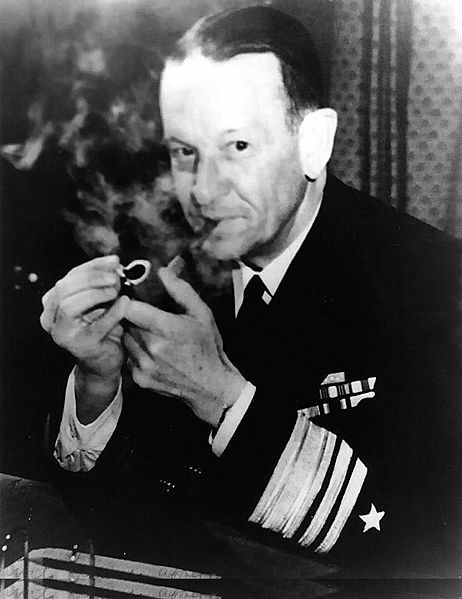Vice Admiral Frank Fletcher
Frank Jack Fletcher was an admiral in the United States Navy during World War II. He commanded the American task force at the 1942 Battle of Coral Sea and also fought in the Battle of Midway.
Born in 1885 in Iowa, Fletcher graduated from the US Naval Academy in 1906. Fletcher was presented with the Medal of Honour in 1914 for for succeeding in getting on rescuing over 350 refugees during the heat of battle. When America entered World War One Fletcher commanded the destroyer ‘USS Benham’.
In the interwar years, America went into a time of international isolationism and its military was relatively dormant.
Fletcher graduated from the Naval War College in 1930, and from the Army War College the following year. Fletcher was made Rear Admiral in 1939 and given command of Cruiser Division III in the Atlantic Fleet.

Fletcher became commander of the aircraft carrier ‘USS Yorktown’ towards the end of 1941. War in the Pacific against Japan looked likely; aircraft carriers would be the most highly regarded ships in such a campaign. Fletcher must therefore have been held in high esteem by senior naval figures.
Fletcher participated in the first offensive American campaigns in World War Two: raids on the Marshall and Gilbert Islands. Fletcher was then made Vice Admiral.
Fletcher was given command of Task Force 17 in the run-up to the Battle of Coral Sea, which also had overall tactical command from Chester Nimitz to Fletcher, including control over Task Force 11, led by Aubrey Fitch from the USS Lexington ship. America suffered in this battle: she lost the carrier ‘Lexington’, the destroyer ‘Sims’ and the oil tanker ‘Neosho’, as well as 33 planes. In comparison, the Japanese lost the light carrier ‘Shoho’ and 43 planes. Despite America’s losses, the battle has generally been viewed as a victory for America because they stopped the Japanese capture of Port Moresby in New Guinea, which would have isolated Australia.
Fletcher then took part in at the Battle of Midway between 4 June and 7 June 942. ‘Yorktown’ planes sank the ‘Soryu’. However the ‘USS Yorktown’ was attacked by a Japanese submarine, planes and torpedoes and was sunk. America’s losing two carriers was countered by Japan’s loss of four carriers at Midway. However, America was able to replace their lost carriers much more easily than Japan.
Fletcher commanded a task force in August 1942 which attacked Guadalcanal. This battle resulted in severe US casualties. Fletcher then commanded a carrier force including ‘USS Saratoga’, ‘USS Enterprise’, and the ‘USS Wasp’. This was greatly affected in August 1942 at the Battle of the Eastern Solomons. Critics of Fletcher believed that his strategies had been overly cautious.
From December 1943 until the end of the war, Fletcher commanded US Naval Forces in the North Pacific Area. After Japan’s surrender Fletcher supervised the occupation of Hokkaido (northern Japan).
In September 1945, once hostilities had ended in the Far East, Fletcher went to Mutsu Bay, off Ominto, Honshu, Japan, with 60 ships of his North Pacific Force for the emergency naval occupation of northern Japan where he accepted the surrender of the Imperial Northern Fleet. In a speech to his men he famously said:
"Recalling the rape of Nanking, the treachery of Pearl Harbor, the Death March of Bataan, and the murder, torture, and starvation of our comrades in arms, ours will not be an occupation in the Japanese manner. We have shown the Japanese and the world the superiority of our arms. We must now demonstrate to the world and the Japanese people the superiority of these standards of justice and decency for which we fought."
Frank Fletcher died on 25 April 1973, four days before his 88th birthday.
See also: Admiral William Fredrick
MLA Citation/Reference
"Vice Admiral Frank Fletcher". HistoryLearning.com. 2026. Web.
Key facts
| Name: | Vice Admiral Frank Jack Fletcher |
| Birth Date: | April 29, 1885, Marshalltown, Iowa |
| Death: | April 25, 1973 (aged 87), Bethesda, Maryland |
| Country: | United States of America |
| Awards/Decorations |
|
